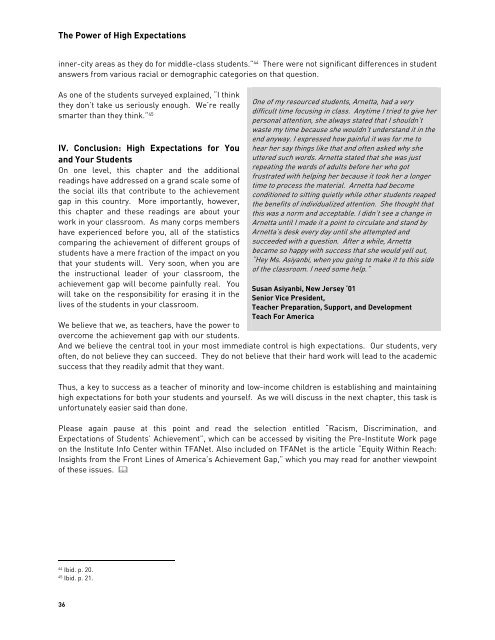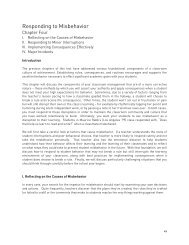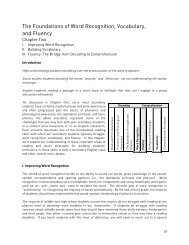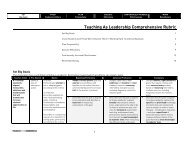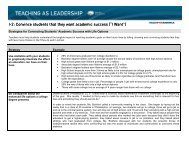The Power of High Expectations - Teaching As Leadership
The Power of High Expectations - Teaching As Leadership
The Power of High Expectations - Teaching As Leadership
You also want an ePaper? Increase the reach of your titles
YUMPU automatically turns print PDFs into web optimized ePapers that Google loves.
<strong>The</strong> <strong>Power</strong> <strong>of</strong> <strong>High</strong> <strong>Expectations</strong><br />
inner-city areas as they do for middle-class students.” 44 <strong>The</strong>re were not significant differences in student<br />
answers from various racial or demographic categories on that question.<br />
<strong>As</strong> one <strong>of</strong> the students surveyed explained, “I think<br />
they don’t take us seriously enough. We’re really<br />
smarter than they think.” 45<br />
IV. Conclusion: <strong>High</strong> <strong>Expectations</strong> for You<br />
and Your Students<br />
On one level, this chapter and the additional<br />
readings have addressed on a grand scale some <strong>of</strong><br />
the social ills that contribute to the achievement<br />
gap in this country. More importantly, however,<br />
this chapter and these readings are about your<br />
work in your classroom. <strong>As</strong> many corps members<br />
have experienced before you, all <strong>of</strong> the statistics<br />
comparing the achievement <strong>of</strong> different groups <strong>of</strong><br />
students have a mere fraction <strong>of</strong> the impact on you<br />
that your students will. Very soon, when you are<br />
the instructional leader <strong>of</strong> your classroom, the<br />
achievement gap will become painfully real. You<br />
will take on the responsibility for erasing it in the<br />
lives <strong>of</strong> the students in your classroom.<br />
We believe that we, as teachers, have the power to<br />
overcome the achievement gap with our students.<br />
And we believe the central tool in your most immediate control is high expectations. Our students, very<br />
<strong>of</strong>ten, do not believe they can succeed. <strong>The</strong>y do not believe that their hard work will lead to the academic<br />
success that they readily admit that they want.<br />
Thus, a key to success as a teacher <strong>of</strong> minority and low-income children is establishing and maintaining<br />
high expectations for both your students and yourself. <strong>As</strong> we will discuss in the next chapter, this task is<br />
unfortunately easier said than done.<br />
Please again pause at this point and read the selection entitled “Racism, Discrimination, and<br />
<strong>Expectations</strong> <strong>of</strong> Students’ Achievement”, which can be accessed by visiting the Pre-Institute Work page<br />
on the Institute Info Center within TFANet. Also included on TFANet is the article “Equity Within Reach:<br />
Insights from the Front Lines <strong>of</strong> America’s Achievement Gap,” which you may read for another viewpoint<br />
<strong>of</strong> these issues. �<br />
44 Ibid. p. 20.<br />
45 Ibid. p. 21.<br />
36<br />
One <strong>of</strong> my resourced students, Arnetta, had a very<br />
difficult time focusing in class. Anytime I tried to give her<br />
personal attention, she always stated that I shouldn’t<br />
waste my time because she wouldn’t understand it in the<br />
end anyway. I expressed how painful it was for me to<br />
hear her say things like that and <strong>of</strong>ten asked why she<br />
uttered such words. Arnetta stated that she was just<br />
repeating the words <strong>of</strong> adults before her who got<br />
frustrated with helping her because it took her a longer<br />
time to process the material. Arnetta had become<br />
conditioned to sitting quietly while other students reaped<br />
the benefits <strong>of</strong> individualized attention. She thought that<br />
this was a norm and acceptable. I didn’t see a change in<br />
Arnetta until I made it a point to circulate and stand by<br />
Arnetta’s desk every day until she attempted and<br />
succeeded with a question. After a while, Arnetta<br />
became so happy with success that she would yell out,<br />
“Hey Ms. <strong>As</strong>iyanbi, when you going to make it to this side<br />
<strong>of</strong> the classroom. I need some help.”<br />
Susan <strong>As</strong>iyanbi, New Jersey ‘01<br />
Senior Vice President,<br />
Teacher Preparation, Support, and Development<br />
Teach For America


